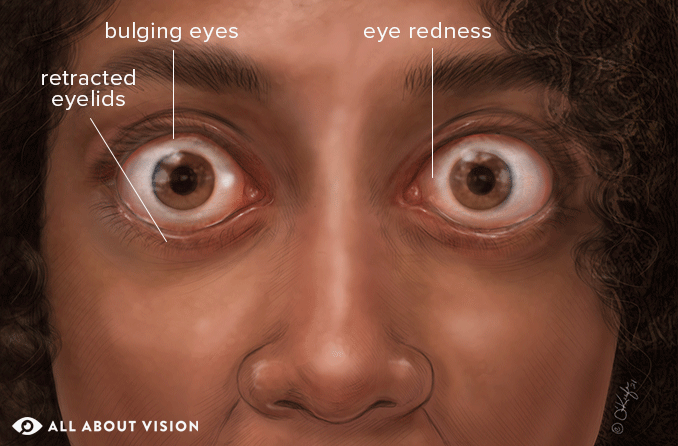
Grave's Disease
If you have an overactive thyroid (hyperthyroidism) your thyroid gland produces too much of the thyroid hormones. This causes high levels of the two main thyroid hormones triiodothyronine (also known as T3) and thyroxine (also known as T4) in your body.
Several conditions can cause your thyroid to become overactive.
Graves' disease is one such disorder that affects approximately four out of every five people with an overactive thyroid gland.
Overview
Graves’ disease also known as toxic diffuse goiter is an autoimmune disease that affects the thyroid gland. The gland produces too much thyroid hormone a condition known as hyperthyroidism. It also often results in an enlarged thyroid. Thyroid hormones regulate body temperature heart rate and metabolism. An overactive thyroid causes problems with organs like the heart as well as bones and muscles.
Causes
Graves disease is more prevalent in women than in men. The age range of 30 to 60 is when women are most frequently impacted. Graves' disease is more common in some women than in others. Your risk increases if you:
Have a family history. Graves' disease can run in families.
Suffer from another autoimmune condition such as lupus type 1 diabetes rheumatoid arthritis or pernicious anemia.
Are experiencing stress. Graves' disease may develop as a result of severe emotional stress or trauma.
Just had a baby: Being pregnant affects the thyroid gland. In the year following childbirth, the chance of developing Graves' disease increases sevenfold. This implies that in certain women pregnancy may either cause or reveal Graves' disease.
Have a history of infections: The onset of Graves' disease may be influenced by infection. Graves' disease and infection with the Epstein-Barr virus which causes mononucleosis have been linked by researchers.
Smoke: Smoking increases your risk of Graves' disease. It is also a leading risk factor for the eye problem seen in Graves' disease known as Grave's ophthalmopathy.
Symptoms
Anxiety and irritation.
A fine tremor of the hands or fingers.
Heat sensitivity increases perspiration or warm moist skin.
Weight loss despite normal eating habits.
Enlargement of the thyroid gland (goiter).
Menstrual cycle changes.
Erectile dysfunction or decreased libido.
Frequent bowel movements.
Bulging eyes (Graves ophthalmopathy)
Fatigue Graves' dermopathy is characterized by thick red skin on the shins and tops of the feet.
Heart palpitations (rapid or irregular heartbeat) Sleep disturbance.
Ayurvedic View
Galaganda- ati agni- Here gala refers to neck and ganda is a swelling resembling shape of button, filled bladder etc, the disease in which there is swelling in front of the neck hanging pendulously like a srotum, either big or small, or due to hormonal imbalance can affect digestion, cardiac, menstrual cycle, psychological health etc.this is grave's disease. Ayurveda way of approach is to correct ati agni (metabolism), bring doshas back to prakruta awastha (balance state), reduce the symptoms and prevent the complications by ayurvedic panchakarma treatment and treatment done to improve the function.
Ayurvedic Treatments
Snehanam Shirodhara Kashaya dhara Lepanam Virechanam Nasyam Takra dhara Navara pinda Swedanam
Naturopathy Treatments
Spinal bath Immersion bath Mud therapy Neck Packs Reflexology Magnetotherapy Acupuncture Manipulative therapy Diet therapy Clinical yoga Cyclic meditation Mind sound resonance technique Pranayama Dorn therapy
Grave's Disease
Treatment for
DISCLAIMER: Listed treatment details are only for information purposes. Treatments and duration may vary depending on numerous factors. Treatments for your condition may not be limited to this list.






















